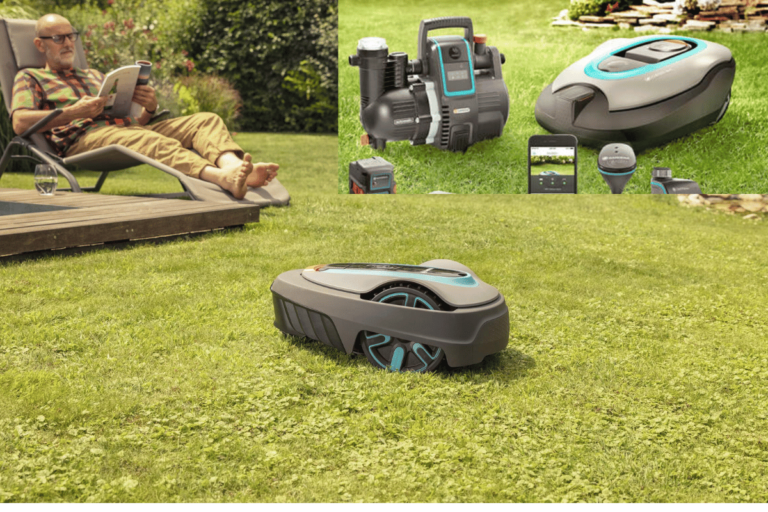Garden automation uses smart devices and technology to make gardening tasks more accessible and productive. These devices can be used for watering, monitoring plant health, controlling pests, and managing garden lighting. The following are some everyday smart garden gadgets:
Intelligent Sprinkler Controllers: Smart sprinkler controllers utilize sensor weather data to optimize watering schedules. They are equipped to adjust the irrigation timing according to moisture in soil, temperature and rainfall so that water gets used on plants properly, saving water and helping them grow well. Smart sprinkler controllers are connected using smartphone apps, making it easy for users to monitor their progress.
Example: Rachio’s Smart Sprinkler Controller uses actual weather information, automatically adjusting its schedule when needed, and saves water.
Soil Moisture Sensors: Soil moisture sensors measure soil’s moisture content and provide real-time information to determine the best way to irrigate your garden. This way, you do not have to watch the fields all day because they can be paired with intelligent irrigation systems providing sufficient soil requirements. Soil moisture sensors are helpful for plants that need only a specific amount of water, thus helping prevent over or under-watering situations.
Example: Ecowitt soil moisture sensor has accurate readings that when connected to an intelligent system, an irrigation system initiates automated watering.
Weather Stations: These stations help monitor environmental parameters like temperature, humidity, precipitation and wind speed, among others. Consequently, these parameters influence gardening, such as planting decisions and pest control measures, if any, should be taken at specified times during the year. Therefore, besides working with intelligent irrigation systems, they can also work with other garden appliances for a complete garden management system.
Example: Ambient weather WS-2902c weather station offers extensive weather information and integrates with intelligent garden machines.
Intelligent Lighting Systems: With innovative lighting systems, you can control garden lights remotely and schedule them on or off. Most popular systems allow homeowners to program their garden lights depending on when the sun sets or rises or whenever any movement is detected within the garden. Intelligent lighting systems are, among other things, meant to add aesthetics to your gardens and provide security.
Example: Philips Hue Outdoor Lights can be controlled using an application, allowing you to set schedules and adjust brightness from wherever you are in a compound.
How Automation Enhances Gardening
Task automation has made gardening more straightforward and efficient and has produced healthier plants. It saves gardeners time and energy that they would have otherwise used for such operations while concentrating on the rest of the garden care.
Better Watering Efficiency: One of the main reasons why people choose to automate their gardens is improved watering efficiency. Intelligent sprinkler systems and soil moisture sensors ensure that the water applied reaches its target, thus reducing waste of this natural resource and preventing plants from being overwatered and root rot from occurring. For example, it fosters better crop growth, reducing hand-watering needs.
Example: Through reduced water consumption by up to 50%, automated watering systems maintain an optimal moisture level required by crops.
Improved Pest and Disease Management: Another area where automation aids are pest control and disease prevention. It allows you to take early action in case pests emerge by utilising various innovative items like weather stations or plant health monitors, giving real-time information about what must be done immediately. Therefore, timely interventions reduce the chemical spraying burden during outbreaks.
Example: Monitoring devices may signal conducive conditions for pests/disease development so that one can take preventive measures accordingly.
Convenience and Accessibility: Garden automation enhances convenience and accessibility. Remote monitoring and control over smartphone applications enables gardeners to manage their gardens from anywhere, simplifying their day-to-day work and response to changing situations. It becomes even more critical for people with movement problems or who are too busy.
For example, an application that syncs with garden devices may let you know when to irrigate, fertilize, remove an unwanted plant, or perform any other gardening activity in your backyard or home, ensuring consistent care of your garden.
Conclusion
Incorporating smart devices and automation into your garden can make gardening more efficient, productive and fun. Automation will help you decide how to use resources effectively and enhance your garden’s health and attractiveness. By embracing garden automation, one can spend less time managing it and enjoy their garden.
Explore More Gardening Tips and Ideas
- Growing Bonsai: Tips for Miniature Tree Enthusiasts
- Buying Bonsai: Tips for Selecting Your Perfect Tree
- Bonsai Potting: Essential Tips for Tree Care Success
- Bonsai Maintenance: Essential Care for Tiny Trees
- Mastering the Art of Shaping Bonsai: A Beginner’s Guide
Source: Smart Gardening


